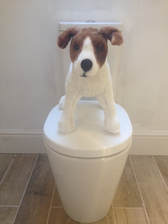 It's a common problem when you get a new puppy. How do you stop them peeing & pooping everywhere?? It can seem like every five minutes your pup is having a little accident. This is where good management, cleaning & lots of praise can transform your toilet training. 1. Pre-empt the situation: Once your puppy has had something to eat after about 20-30 minutes take them outside or to the puppy pad & wait for the inevitable to happen. Give lots of excited praise when your puppy toilets in the right place so that your puppy begins to learn where to do their business. Even if your puppy hasn't eaten recently take them to the toilet area regularly and remember praise praise praise when they get it right. 2. Don't Punish: If your puppy has an accident don't punish them: This creates puppies who only learn not to toilet when you are watching them. The second you stop watching them they have to go! Punishing your puppy doesn't tell them where they should toilet so it is not very useful. 3. Have realistic expectations: Young puppies only have small bladders so don't expect your puppy to be able to hold it for long periods particularly overnight to begin with. Puppies will often also have a little wee when excited but do eventually grow out of this. 4. Clean up well: A dog's sense of smell is far superior to ours. Using a regular household cleaner does not break down the enzymes in dog urine and faeces. This can lead to some dogs returning to favoured areas within your home simply because they still smell like a toilet area. Use bleach or an enzymatic cleaner to help break this cycle. 5. Think about other factors: Has your puppies toilet training suddenly gone backwards? Has there been a change in your household such as building work, a new addition to the family or a change in routine? Sometimes even a small change such as leaving your puppy in a room with the dishwasher/washing machine running can be enough to scare a young puppy. When your puppy gets anxious they will tend to toilet a lot more within the home. A sudden change in toileting behaviour could also indicate a medical problem such as a bladder infection so if you are at all concerned about the health of your puppy make sure you check in with the vet. Comments are closed.
|
AuthorTamsin Peachey is a Clinical Animal Behaviourist living in Hurley, Atherstone. Tamsin is passionate about dog safety and debunking the current myths surrounding animal behaviour training. Archives
January 2018
Categories |


 RSS Feed
RSS Feed
